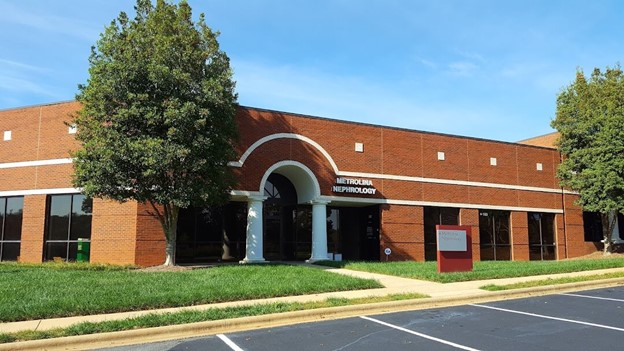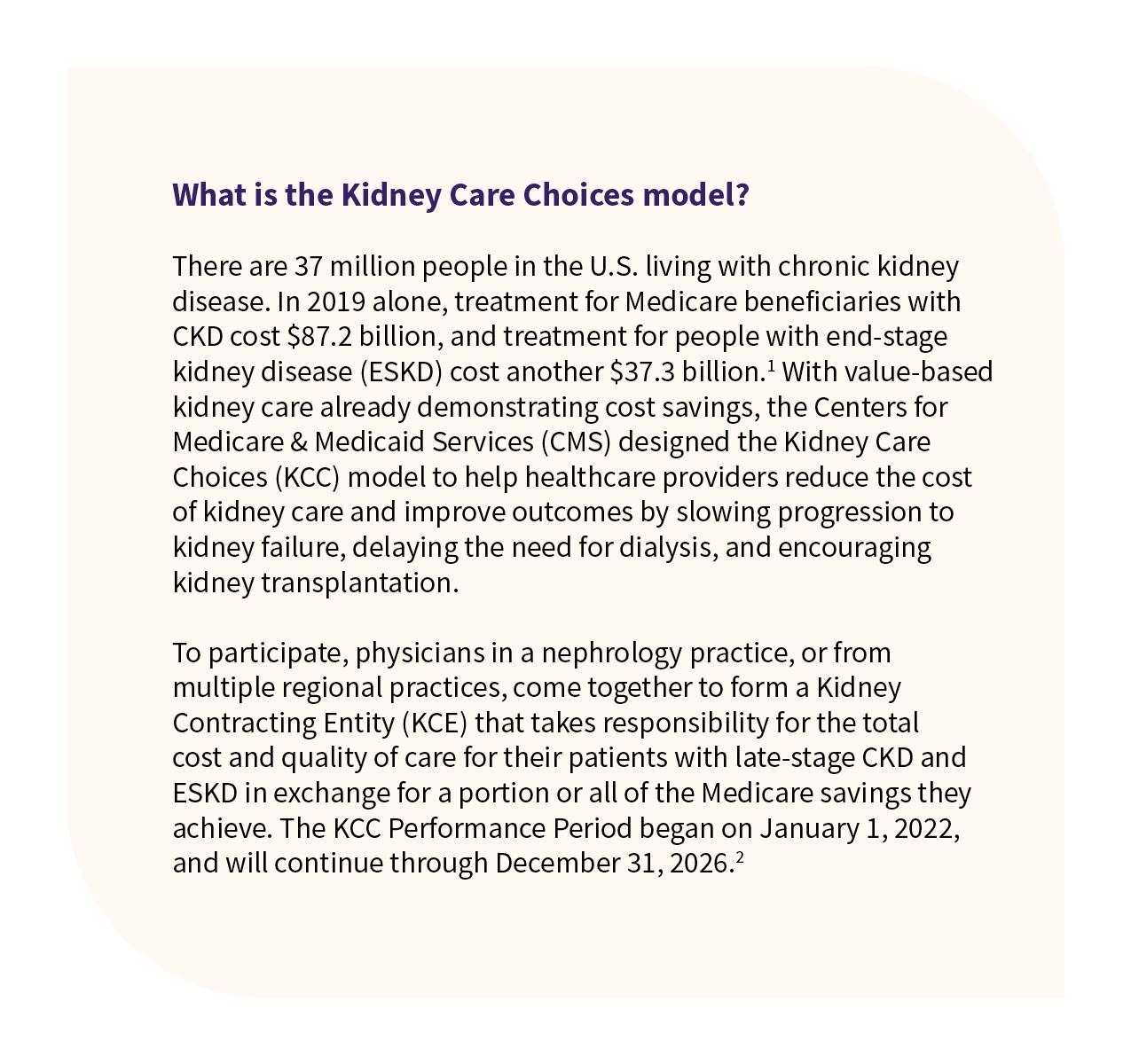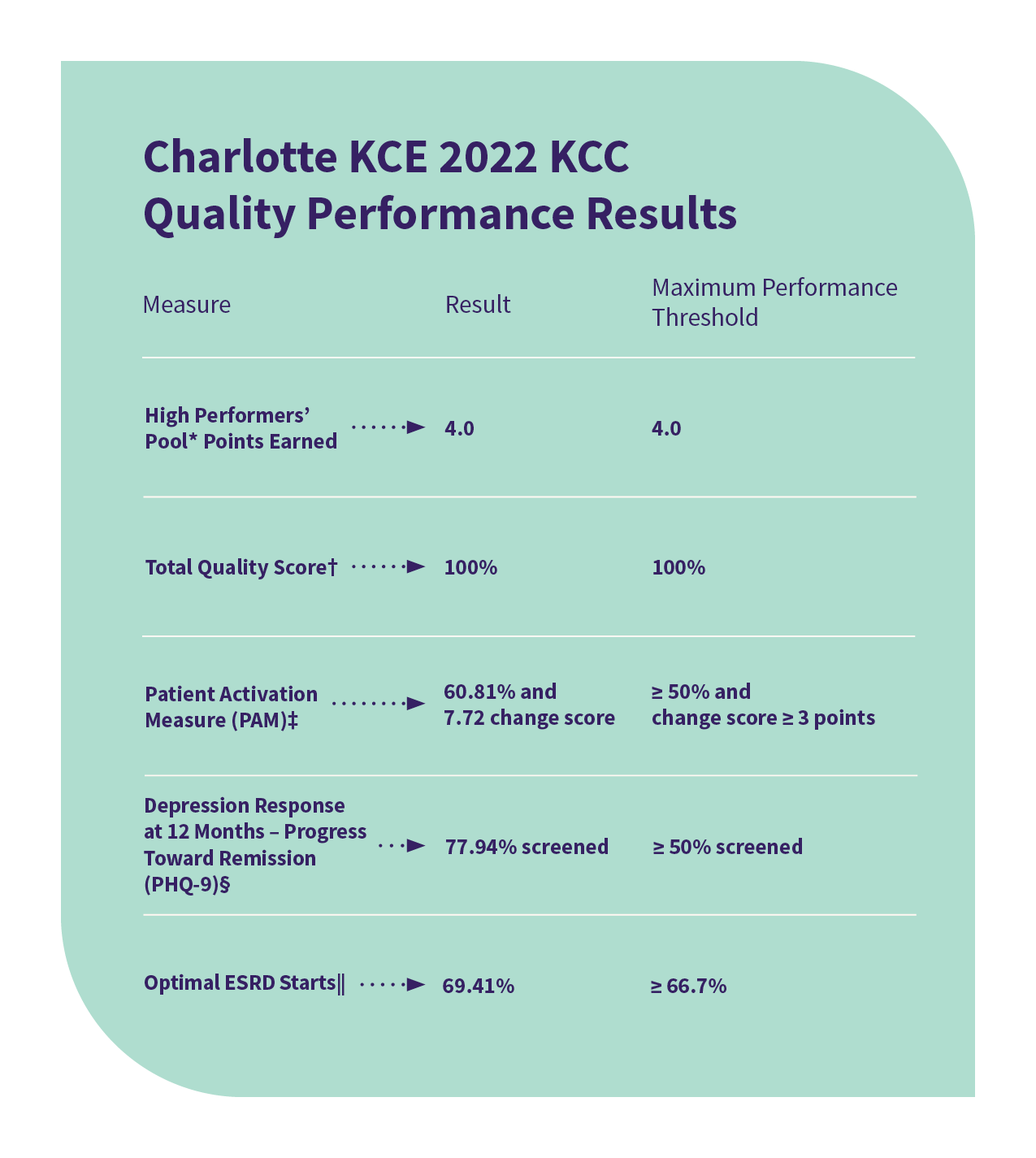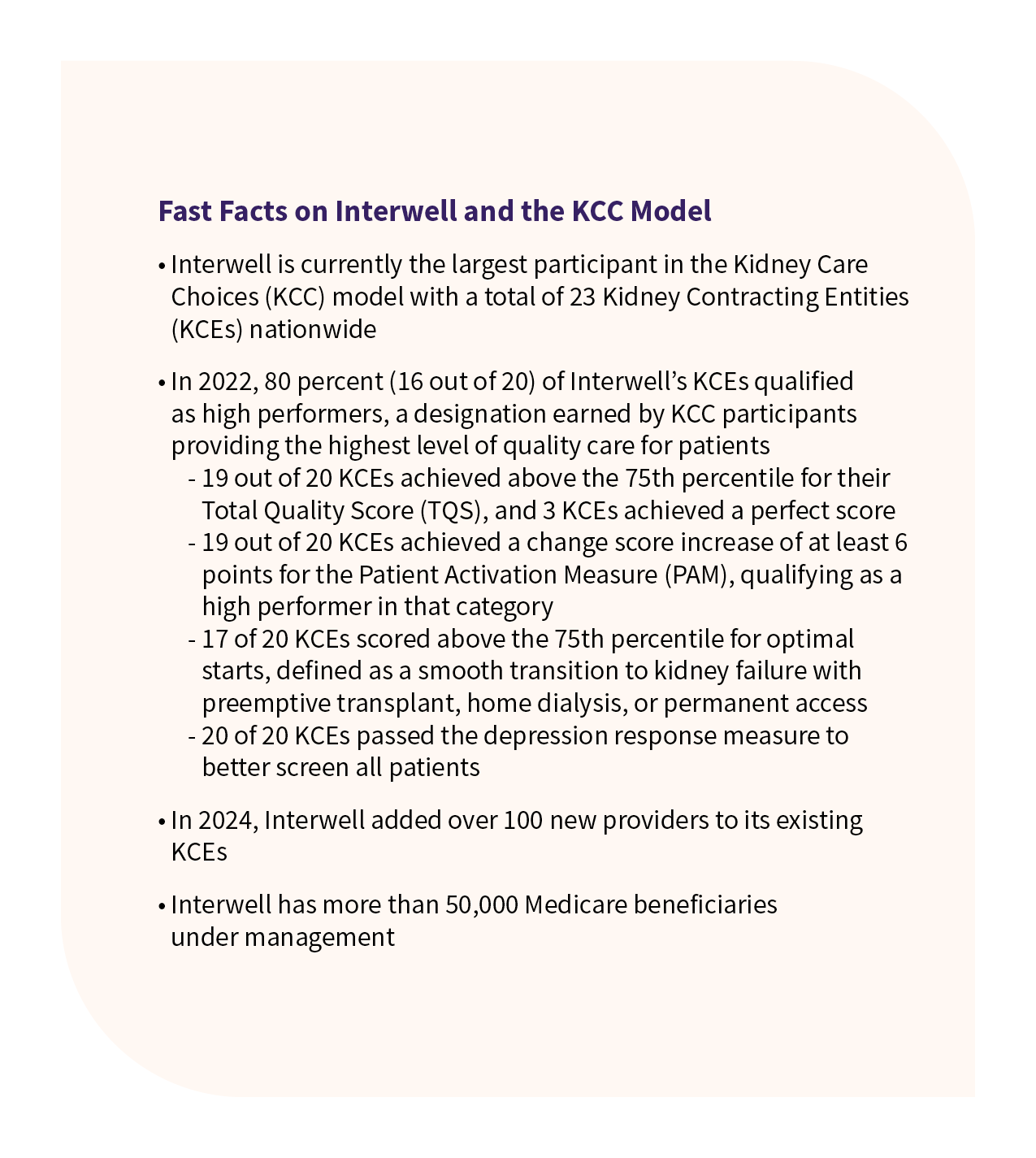How One Nephrology Practice Earned a Perfect Total Quality Score in the Government Value-Based Kidney Care Choices Model
Metrolina Nephrology Associates partnered with Interwell Health to form the Charlotte Kidney Contracting Entity and earned recognition as a top performer in the first year of the national Kidney Care Choices model.
tags

Disclaimer: The statements contained in this case study are solely those of the authors and do not necessarily reflect the views or policies of CMS. The authors assume responsibility for the accuracy and completeness of the information contained in this document.
The challenge: Metrolina needed additional support to build on its strong value-based care foundation and participate in the KCC model.
With an existing chronic kidney disease (CKD) clinic and protocol in place for years, Metrolina Nephrology Associates had a strong foundation in providing value-based kidney care for patients in the Charlotte, North Carolina region. Metrolina had a proven workflow partnering physicians and advanced practice providers to engage and care for patients from CKD to dialysis or transplant. In addition, the practice had been tracking metrics such as optimal starts for more than a decade and had a track record of strong performance.
When the government introduced the Kidney Care Choices (KCC) model to further incentivize value-based kidney care, Metrolina’s physician partners saw an opportunity to build on their success. Before joining, however, they realized they needed additional patient management, administrative, and quality measurement support so their team could continue to focus on delivering high-quality patient care.
The solution: Metrolina partnered with Interwell to form the Charlotte Kidney Contracting Entity
When the Centers for Medicare and Medicaid Services (CMS) solicited applications for the first cohort of KCC participants in 2019, Metrolina decided to form the Charlotte Kidney Contracting Entity (KCE) in partnership with Interwell Health. As a value-based kidney care provider, Interwell offers KCEs resources to enable success in the KCC model, including an interdisciplinary care team, patient education, care coordination, and advanced predictive analytics and modeling to drive continuous quality improvement.
Interwell partnered with Metrolina’s internal practice team to drive data-driven decision making, support patient education, identify any alignment issues, and address new quality metrics such as depression screening. “Interwell supports us in the KCC model with program oversight and administration, ensuring that we are compliant with the program’s evolving criteria, which is not something we could ever keep up with on our own without the additional embedded resources and regulatory and administrative support from Interwell,” said Jennifer Huneycutt, Metrolina’s executive director. “Having Interwell as a partner gives us the confidence that we are executing against the KCC model’s goals at the highest level.”
Working together, Interwell and Metrolina analyzed the practice’s performance data to identify any opportunities for improvement and to predict Metrolina’s performance as the KCC model continues to evolve. Having performance data and analytics readily available enabled Metrolina to engage key stakeholders in the initiative by regularly presenting updates in board meetings and physician group meetings. “Having reliable data to share with our team in all areas of the practice and understanding our participation in the KCC program shines a spotlight on our patient care goals and ignites awareness practice-wide,” added Huneycutt. “There is more attention on these metrics than ever before.”

Results: Charlotte KCE recognized as a top performer in the national KCC program
Based on data from the first year of the KCC model, the Metrolina Charlotte KCE earned recognition as a high performer with a 100 percent Total Quality Score and high marks for measures including optimal starts, patient activation, and depression screening.
“From a physician perspective, our participation in the KCC program is only working because of Interwell,” said Dr. Carl Fisher, president of the Metrolina practice. “Without the Interwell partnership, I don’t know how it would have gotten off the ground and it certainly would not look the way it looks now.”
Huneycutt and Dr. Fisher also credit the Interwell partnership with enabling the growth of Metrolina’s internal value-based care team, which now includes six full-time team members. “There are people that do the work day to day, and at the same time, there is someone organizing it, planning it, and strategically thinking about it,” explained Huneycutt. “One key piece that speaks volumes of the true partnership with Interwell is the two-way collaboration with our internal team. We’ve learned a lot from Interwell, but Interwell has also made adjustments based on our questions and perspectives on things.”

“From a physician perspective, our participation in the KCC program is only working because of Interwell. Without the Interwell partnership, I don’t know how it would have gotten off the ground and it certainly would not look the way it looks now.”
Beyond the data: Patients stand to benefit most from the KCC program and value-based care
Dr. Fisher and the physician partners at Metrolina recognize that their patients are benefiting from the practice’s commitment to embracing value-based care and the KCC model. “We said in one of our last physician meetings that our patients are getting a concierge type experience without spending thousands of dollars a year out of pocket to pay for it,” said Dr. Fisher.
For Jan Fincher, Metrolina’s director of value-based care operations, the benefit to patients is obvious. “Nurses and doctors want what we’re doing for patients, they just can’t physically take the time to do it. Value-based care is enabling us to give every patient the kind of care that we want to give.”
As Interwell and Metrolina continue to partner to deliver value-based care, the practice is committed to adapting new solutions to improve patient engagement and outcomes. For instance, Metrolina is using a texting platform to enroll patients in chronic care management. “The benefit is being able to stay connected to our patients,” said Fincher. “We are beginning to see patients reach out to us early, when problems arise, and well before stopping at the ER. When this happens, we have the opportunity to intervene and hopefully avoid more costly remedies like a hospital stay.”
The team at Metrolina recognizes that the KCC model is experimental and new, but they say it is a step in the right direction. “When I’m old and I’ve got my grandkids on my lap, I can imagine myself saying, ‘I was there when it started, when it changed,’” said Huneycutt. “I feel like we’re right in the middle of major, major change in our healthcare system.”
The future: Metrolina is all in on value-based care
Currently, five to ten percent of Metrolina’s total patient population is in value-based care models. In the future, however, the practice expects almost all of its patient population will be bundled into these models as CMS and private payers continue to push for value-based care. While Dr. Fisher acknowledges challenges with navigating the transition away from the traditional fee-for-service model, he believes physician optimism will grow as practices that perform well, such as Metrolina, begin to see shared savings.
“We are all in on it,” said Dr. Fisher. “Imagine, if we can do this with five percent of our patients, what can we do with 90 percent of our patients if we’re successful?”

For details on Interwell’s performance in the Kidney Care Choices program, read our press release.
Notes:
* In the KCC model Comprehensive Kidney Care Contracting (CKCC) options, practices receive adjusted payments for managing beneficiaries with CKD stages 4 and 5 and ESKD, along with a kidney transplant bonus payment. KCEs are also eligible to earn High Performers’ Pool (HPP) points by achieving set goals above and beyond the requirements for certain measures. The top third of KCEs nationwide that earn the most HPP points receive additional payments.
† The Total Quality Score is the aggregate of a KCE’s scores on the set of quality measures assessed in the KCC model.3
‡ The Patient Activation Measure (PAM) uses a questionnaire to assess an individual patient’s self-reported knowledge, skill, and confidence in managing their own healthcare condition on a scale of 0-100. There are two requirements that must be met to pass this measure. PAM questionnaires must be administered to at least 50% of the identified population and the average PAM change score, which is the difference in results between two questionnaires administered throughout the year, must have an increase of at least 3 points during the 12-month KCC measurement period. 4
§ The Depression Response at 12 Months – Progress Toward Remission measure includes a requirement to screen at least 50% of the identified population to determine if they have depressive symptoms using the Patient Health Questionnaire (PHQ-9), a depression screening and diagnostic tool. This was a reporting only measure in 2022, therefore it did not qualify for HPP points. KCC requirements expanded in 2023 to include measuring progress toward remission among patients identified as being depressed the year prior.5 Depression remission is defined as ≥50% decrease in the PHQ-9 score within 12 months.6
‖ Optimal ESRD Starts is a measure that assesses the percent of new adult ESKD patients during the KCC measurement period who experience a planned start of renal placement therapy by receiving a preemptive kidney transplant, initiating peritoneal dialysis, or initiating hemodialysis via arteriovenous fistula or arteriovenous graft.7
References:
-
Centers for Disease Control: Chronic Kidney Disease: Common, Serious, and Costly.
https://www.cdc.gov/kidney-disease/ckd-facts/index.html#:~:text=Chronic%20Kidney%20Disease%3A%20Common%2C%20Serious%2C%20and%20Costly%201,government%20agencies%2C%20universities%2C%20and%20national%20organizations%20to%3A%20 -
The Centers for Medicare & Medicaid Services: Kidney Care Choices (KCC) Model.
https://www.cms.gov/priorities/innovation/innovation-models/kidney-care-choices-kcc-model -
The Centers for Medicare & Medicaid Services: Kidney Care Choices (KCC) Model: Financial Methodology and Structure for the Graduated, Professional, and Global Comprehensive Kidney Care Contracting (CKCC) Options. https://www.cms.gov/priorities/innovation/files/slides/kcc-ckcc-finance-slides.pdf
-
Partnership for Quality Measurement: Gains in Patient Activation Measure (PAM) Scores at 12 Months.
https://p4qm.org/measures/2483 -
Partnership for Quality Measurement: Depression Remission at Twelve Months. https://p4qm.org/measures/0710e
-
Kidney360: Value-Based Care in Nephrology: The Kidney Care Choices Model and Other Reforms.https://journals.lww.com/Kidney360/Fulltext/2021/10000/Value_Based_Care_in_Nephrology__The_Kidney_Care.19.aspx
-
Partnership for Quality Measurement: Optimal End Stage Renal Disease (ESRD) Starts: https://p4qm.org/measures/2594